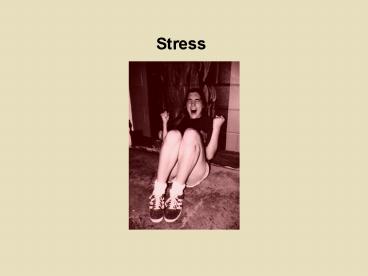Stress - PowerPoint PPT Presentation
1 / 33
Title:
Stress
Description:
Healthy lifestyle. The ... heat, she immediately jumped out and saved her life. ... 'tend and befriend' style. Stress and Health. Immune System. Nonspecific ... – PowerPoint PPT presentation
Number of Views:44
Avg rating:3.0/5.0
Title: Stress
1
Stress
2
Stress
- Stress reactions
- Idiosyncratic reactions to stress
- Stress immunity links
- Healthy lifestyle
3
The story of two frogs...
- Once upon a time, there was a frog who was
dropped into a pot of hot water. Feeling the
intense heat, she immediately jumped out and
saved her life. - But, there was another frog who was put into a
pot of cold water which was set on a burner over
low heat. One degree at a time the temperature
increased, but the frog became accustomed to the
heat, stayed in the pot and eventually was boiled.
4
Stress Definitions
- Negative processes triggered by an event
- Stressors are environmental events (can be
objectively good or bad) - Stress reactions are the physical, psychological,
and behavioral responses
5
Figure 10.1 The Process of Stress
6
Psychological Stressors
- event forces a person to change or adapt
- Examples
- Catastrophic events
- Life changes and strains
- Chronic stressors
- Daily hassles
7
Measuring Stressors
- Social Readjustment Rating Scale (SRRS)
- Life Experiences Survey (events and perceptions
of them) - Students and stress
- Interviews and Dairies
8
(No Transcript)
9
Stress Responses
10
Figure 10.2 GeneralAdaptation Syndrome
11
Organ SystemsInvolved in the GAS
12
HPA Axis
13
Psychological Responses to Stress
- Emotional
- Cognitive
- ruminative thinking
- catastrophizing
- other processes
- problem-solving errors
- impaired decision making
- Behavioral Stress Responses
14
Stress andPsychological Disorders
- Burnout/Depression/Anxiety
- Posttraumatic Stress Disorder (PTSD) is a prime
example - vivid memories of trauma
- anxiety
- mood
15
PTSD
- Determined by
- Perception of a dangerous situation
- Inability to cope
- Result
- Effects on general state of physical and mental
health - Causes
- War
- Sexual abuse
16
PTSD Symptoms
- Nightmares
- Flashbacks
- Memory and concentration problems
- Hyperarousal
- Hypervigilance
- Intrusive memories
- Abnormal startle responses
17
Hippocampal Volume Loss
- Fragmentation of new memory
- Inability to recall old memories
- Cortisol is the culprit
18
Stress Mediators
19
How Stressors Are Perceived
- Cognitive appraisal of the stressor
- Influence of cognitive factors weakens somewhat
as stressors become more severe
20
Cognitive Appraisal
21
Cognitive Influenceson Stress Responses
22
Prediction and Control
- predictable versus unpredictable
- intense and relatively short period, especially
- controllable versus uncontrollable
- perception of control reduces stress
23
Coping Resourcesand Coping Methods
- Resources
- money
- time
- Methods
- problem-focused
- emotion-focused
24
(No Transcript)
25
Social Support
- quantity
- quality
- situation
- right type
26
Stress, Blood Pressure, and Support
27
Stress and Personality
- Disease-prone personalities tend to
- stress viewed as long-term, catastrophic threats,
brought on by self. - pessimistic about ability to overcome
- Stress-hardy or disease-resistant
- stress is short term
- dispositional optimism (adds four years to life)
28
Stress and Gender
- Males tend to get angry and/or avoid stressors
- fight-or-flight pattern.
- Females are more likely to help and get help
- tend and befriend style.
29
Stress and Health
30
Immune System
- Specific
- Lymphocytes (memory cells)
- T-cells
- B-cells
- Nonspecific
- high temperature
- macrophages (big eaters)
31
Acute or Good Stress
- Increased traffic of lymphocytes and macrophages
- related adrenal secretion (SAM)
- enhances responses for which there is an
immunologic memory - beneficial for cancer tumour cell, but
pathologic for autoimmune or allergic responses
32
Chronic or Bad Stress
- Reduced traffic of lymphocytes and macrophages
- Associated with increased HPA activity
- increased severity of many common illnesses
33
Stress, Illness, and the Cardiovascular System
- Repeated activation of fight or flight linked
to coronary heart disease, hypertension, and
stroke. - Physical reactions depend partly on ones
personality (hostility)































